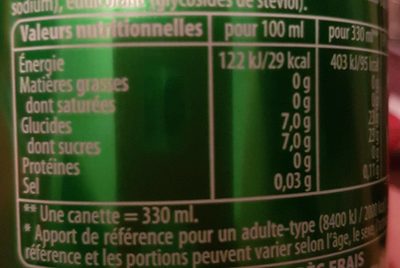7UP saveur citron & citron vert 33 cl - 330 ml
This product page is not complete. You can help to complete it by editing it and adding more data from the photos we have, or by taking more photos using the app for Android or iPhone/iPad. Thank you!
×
Some of the data for this product has been provided directly by the manufacturer PEPSICO FRANCE.
Barcode: 3502110008978 (EAN / EAN-13)
Common name: Boisson gazeuse saveur citron citron vert avec sucre et édulcorant.
Quantity: 330 ml
Brands: 7UP
Categories: Plant-based foods and beverages, Beverages, Plant-based beverages, Carbonated drinks, Fruit-based beverages, Artificially sweetened beverages, Sodas, Fruit sodas, Lemon soft drinks
Labels, certifications, awards:
Green Dot
Stores: Auchan
Countries where sold: France
Matching with your preferences
Environment
Packaging
Transportation
Other information
Preparation: Servir très frais
Conservation conditions: À consommer de préférence avant : voir sous la canette.
Customer service: PepsiCo France, 15 boulevard Charles de Gaulle 92705 Colombes CEDEX
Report a problem
Data sources
The manufacturer PEPSICO FRANCE uses Equadis to automatically transmit data and photos for its products.
Manufacturers can use the Open Food Facts free plaform for producers to access and complete this data, and to obtain reports, analysis and product improvements opportunities (e.g. better Nutri-Score).
Product added on by kiliweb
Last edit of product page on by albane47.
Product page also edited by alex102010, epfoodeye, foodvisor, iamanouck, moon-rabbit, openfoodfacts-contributors, org-pepsico-france, yuka.RzVnNEhid0NqZjQyeC9FaDNSenAvZFVzNDUrVUFGenRDK2NLSWc9PQ, yuka.U2YwbEx2a1kvUFFObWNFZDVSK0VvdjFVd3FhbFpUaTNDcm9vSVE9PQ, yuka.UXY0NVM1azZqTUF5bC9aZyt3L085dmhiM0pPeEFEMmVNL0lXSVE9PQ, yuka.V0pBQkxMUmNqL1lhc3RvdTR4TDNwL2xaL3BxVGZGL3ZkL1pNSVE9PQ, yuka.V29rOEw3OE90dGdWbHZGaDhpanc0dFpvNXJpWEJqM21EL1l3SVE9PQ, yuka.VDR0ZVA3UXRpUE0wc01FVnhCLzQrdWxKMW9DcVVqMmNFTmMvSVE9PQ, yuka.VDRjN0tKOGg5NlJRZy8wNCt5M2YyUEJJenNlaVVrYUhCL1VJSVE9PQ, yuka.VElBTExyeGErUFEwb2ZZZnd4SHkxZWxjOTdMeWJHYm5OKzhUSWc9PQ, yuka.VzQ4K0MvbFl1S2xWZzhKdnBSSG4zczFRNlk2T0JVMnlBZWtPSWc9PQ, yuka.WWFFOE80NEErOEV6dHMwMTB6bnk2T3hQNjUyMlVUcVNjOHNUSVE9PQ, yuka.WkkwUklZWSsrZFV3dGRzQXBFako4NHQzMWJ5ekRIS2xldTVMSUE9PQ, yuka.Wlo0bEg3ayt0OTB1Z2NVOStoajg2T3A4MWJtRlIwaU5KN29USWc9PQ, yuka.Wlp3Q1Q2WmRxdDhxb3ZRRTNDSDZ3L05Md2I2TlQwYStBY29OSWc9PQ, yuka.YXFNNkFKb010K1VLcXMwTTFTSGE1YzFPeGJ5R1RXVHBEOGc4SUE9PQ, yuka.YktZYlFmMHYvZUVyaTlvY3JoM1dwZXRzeElXdURFR3JPZUE5SUE9PQ, yuka.ZTQ4bFRwdzZxdjRFaHRzMDNUcngzK041bm9HS1lWRzNkZEVnSVE9PQ, yuka.ZW93ckg2WUtoc0lCbnZjaDN5cmIxWWtsNXA2cFYxS1JKOUE3SVE9PQ, yuka.ZWE4dUM1a0JwK1lXb2ZBMStqTHc4L3h2L3M2M2RGeW1lOUlPSVE9PQ, yuka.ZXI0SEw2MWVqK1Ftd01VeitocjU1dDFPN0tIMFhVaVJHc2hBSVE9PQ, yuka.ZjY4cE41NGVxdndYdmM4MDNCekV3WUpMeE1hbWZqeStOT0VUSWc9PQ, yuka.ZktrTEc1d2xwK0EydE13NnJqVHVwOWg3eTUyV1QyZXpHdlZMSUE9PQ.










